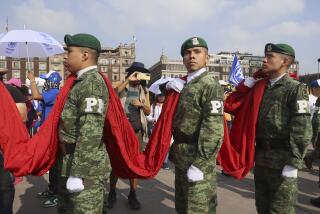Goodluck Jonathan seems headed for victory in Nigeria
- Share via
Reporting from Abuja, Nigeria — Judging by early election results Sunday, incumbent Goodluck Jonathan was set to win Nigeria’s presidential election in what appeared to be the nation’s fairest vote since the end of military rule in 1999.
His first-round victory would mark the first time a president from what Nigerians call the South South — the Niger Delta oil-producing region, the most developmentally backward in the country — has risen to be an elected head of state.
Adored by southerners, and particularly the poor, Jonathan, 53, found himself Nigerian president by chance last year after the death of his predecessor, Umaru Yar’Adua. In the election campaign, he capitalized on his disadvantaged background as the son of a canoe-maker with the slogan, “If I can, you can.”
His primary challenger, Muhammadu Buhari, a 68-year-old former military ruler with a tough, disciplinary reputation, won large swaths of the north but didn’t appear to have garnered enough support to force Jonathan to a second round of voting.
The vote was accompanied by less preelection violence than past polls, notably the chaotic 2007 general elections. But the protests that broke out Sunday, and the sectarian division evident in voting patterns, raised fears of further disturbances once the official results are announced.
To win in the first round, Jonathan needed not just the highest number of votes but also 25% of the votes in two-thirds of the 36 states. He clearly won the most votes overall — and looked set to reach the required support in 24 states.
According to a vote tally by Reuters, Jonathan had won more than 20 million votes while Buhari had won 10.4 million. Nuhu Ribadu, seen as an outside challenger, was coming in a distant third with about 1.5 million. According to the tally, Jonathan had gained the required support in 24 states.
Jonathan was the candidate of the People’s Democratic Party; Buhari the candidate of the Congress for Progressive Change; and Ribadu the candidate of the Action Congress of Nigeria. The ACN did well in parliamentary elections a week ago, winning Lagos, the commercial capital, but flopped in the presidential race. Jonathan sailed through in Lagos and performed strongly in other ACN strongholds in the southwest.
No progressive central tallies or percentages were released Sunday by the Independent National Electoral Commission, but the overall results were expected to be announced Monday.
Jonathan’s People’s Democratic Party, or PDP, has won every election since 1999, often through blatant vote rigging, violence and cheating. But in contrast with previous elections, when votes were collated in secrecy, and long delays in the count were followed by sudden leaps in support for the party, this time the electoral commission ensured an open process that was praised by international observers.
Two prominent African leaders from countries that have held successful democratic votes — Festus Mogae, former president of Botswana, and John Kufuor, former president of Ghana — both praised the election, saying Nigeria seemed to have put its history of flawed polls behind it.
The results showed Nigerians voted along sectarian and ethnic lines: Jonathan, a southern Christian swept the mainly Christian south but had trouble making significant inroads in the mainly Muslim north, where Buhari, a Muslim, is strong.
Africa’s most populous state has often experienced sectarian violence in the central states on the north-south religious fault line, and the voting results indicated how polarized the country remains between north and south.
Southerners are resentful of long periods of domination by northern military rulers, and northerners feel marginalized after Jonathan abandoned an internal deal within the PDP to alternate the leadership between a northerner and a southerner, so that he could run as president.
Under the terms of the deal, a northerner should have run as the PDP candidate.
Jonathan has made numerous promises, designed to appeal to northerners, to revitalize agriculture and the northern textile industries. He also has met with northern powerbrokers — including some of his harshest critics — over the breaking of the PDP’s internal power-sharing deal.
In an appeal to the broader population, he’s promised to boost spending on the country’s decrepit electricity infrastructure and the railways to create jobs.
But in the north, youths angry at perceived rigging launched riots on Sunday, and police in some areas fired tear gas to disperse those chanting pro-Buhari slogans and tearing down Jonathan campaign posters.
Nigeria, a major oil-producing nation, has to import food and fuel — and more than half the population lives on less than a dollar a day, according to United Nations figures.
The election turnout was low in some areas — only about a third of voters went to cast ballots in Lagos. Analysts suggested that voter cynicism, after years of rigged elections, was a factor.
The election held campaign lessons for politicians, who have not been focused on voters in past balloting: then, preparing for a poll meant lining up your own people as electoral commission officials, paying bribes, and organizing as many armed thugs as possible.
More to Read
Sign up for Essential California
The most important California stories and recommendations in your inbox every morning.
You may occasionally receive promotional content from the Los Angeles Times.













